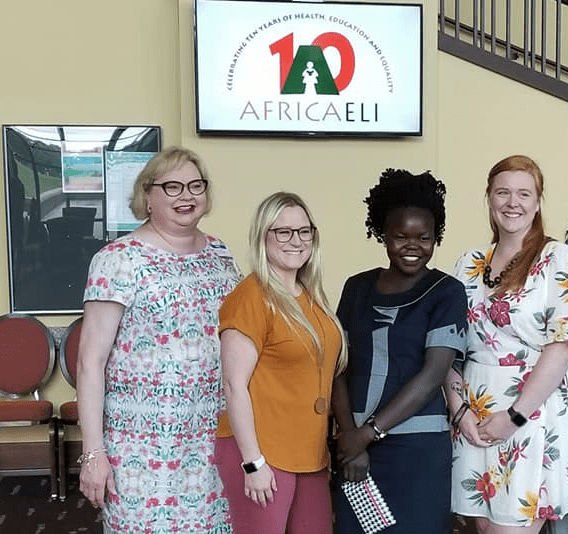Last month, South Sudanese student Betty Asha began classes at Maryville College, her journey to a college education supported by local donors through the Knoxville-based group Africa Education & Leadership Initiative. For Anita Henderlight, Africa ELI’s executive director, it was one of the proudest moments in her organization’s effort to empower the girls of South Sudan. It also brought full circle Henderlight’s own journey of discovering the challenges facing the young people there.
It started in July 2005, when Henderlight read the book “They Poured Fire on Us From the Sky.” It tells the story of the Lost Boys of Sudan, thousands who were settled in America with host families and host churches after they fled unaccompanied to refugee camps during warfare.
In many ways, Henderlight says, “They became responsible for educating people about children and warfare.”
She wrote the authors of the book and learned that three of these young men were students at Maryville College. She met with them several times and asked so many questions about their homeland that they urged her to go. In April 2006, she made her first trip to Africa.
That led to Henderlight being invited to speak at a Lost Boys reunion at George Mason University, where she met two men who were starting an organization that would build schools for girls in South Sudan. Until then, she had been working in children’s ministries for the Holston Conference of the United Methodist Church here. She threw herself into fundraising for the new organization, and in 2008, the first school opened in the village of Yei, South Sudan, with four teachers and 48 girls.
This began a cycle of ups and downs that taught Henderlight that in Africa, “You have to be nimble, you have to be creative and you have to be adaptable.”
When troops led by strongman Joseph Kony threatened to march past the campus in 2009, Henderlight and staff placed the girls within schools in the village and contributed funds and resources to them.
A new campus opened in 2011, the same year that South Sudan became a nation. Independence Day, July 9, 2011, “… was one of the most meaningful days of my entire life,” Henderlight says. “I can only imagine how the local people felt when the flag went up for the first time.”
But, she says, when South Sudan gained its independence, its issues – particularly tribal conflicts and land disputes – did not go away. A civil war erupted in 2013. Yei was considered one of the safest places, but she questioned whether they were doing the right thing in keeping the school open. They kept on.
Through 2014 and 2015, the students learned. They followed a rigid curriculum and practiced literacy by reading letters from the Americans who were supporting them. They learned leadership skills.
“We really wanted them to think about a future,” Henderlight says.
Then came 2016, when the war came to Yei, along with famine and atrocities.
That whole year, Henderlight says, “I didn’t want to get out from under the covers. We could not in good conscience continue there.”
After a tense extraction from the campus, the organization placed its 72 girls in schools in Uganda and safer places in South Sudan.
After losing two physical campuses, “I decided we were out of the construction business,” Henderlight says.
Instead, donor funds pay the girls’ tuitions and buy them necessities for daily dorm life. More than 2,700 students have received scholarships.
Henderlight tells their stories to lots of different people, from religious organizations (the United Methodist Women have been supporters since the beginning) to civic groups. Last month she presented to the sixth-grade class at Cedar Bluff Middle School and the Kiwanis Club at Tellico Village. She is an active member of the Rotary Club of Bearden, and she became a Rotary International Paul Harris Fellow, one of the organization’s highest honors, in 2018.
She says a late mentor, Lucy Gibson, put support behind her early, introducing her to the Knoxville Association of Women Executives and others.
Gibson passed away four years ago but “remains a spark,” Henderlight says.
“She was a strong advocate for women and equality,” Henderlight says, and she didn’t care if the women were in Knoxville or South Sudan.
Of the girls in South Sudan, Henderlight wants people to know that 52 percent of them are married before age 18. Families force girls into marriages, trading them for cattle.
“I want people to know about the resilience they have, to go out in search of opportunities,” Henderlight says of the girls. “They have a lot of challenges, but they are strong, and they are smart, and they are determined. They want a better life for themselves, also.”
Since the organization was founded, the goal has always been to have indigenous people in charge. In July, Henderlight will turn executive duties over to two Africans. One, Zahara Namanda, was recently awarded a Mandela Washington Fellowship and will come to the United States this summer. Henderlight is eager for her to meet local groups and donors.
“I will continue to cheerlead, but I believe fully in their ability,” Henderlight says.
As for Henderlight?
“I’m going to start a school in Tanzania,” she says, grinning broadly. The Anglican Diocese of Kondoa has built a school building there and wants to hire her on a contract basis. She jokes that “a suitcase is my permanent address” but is very serious about what calls her across continents and back again.
“We can’t ignore pockets of our global family,” Henderlight says. “I like to think of the world as being my home.”

